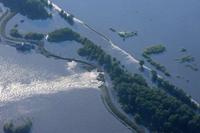-
Lawmakers blast DHS for problems with chemical facility security program
At a recent Congressional hearing, lawmakers blasted DHS officials for their failure to follow through with a program designed to secure chemical facilities in the United States
-
-
Invisibility cloak to protect buildings from earthquakes
Scientists show that by cloaking components of structures with pressurized rubber, powerful waves such as those produced by an earthquake would not “see” the building — they would simply pass around the structure and thus prevent serious damage or destruction
-
-
Preventing earthquake-induced soil liquefaction to protect buildings
When earthquakes occur, buildings can shift or fall; often, the failure is because of soil liquefaction, a phenomenon that occurs when loose, water-saturated soils lose strength in response to the sudden shaking from an earthquake, causing the soil to behave like a liquid; scientists have come up with a way to minimize liquefaction
-
-
Shape-memory alloys for earthquake-resistant structures

To improve the performance of structures during earthquakes, researchers have been investigating the use of “smart” materials, such as shape-memory alloys, which can bounce back after experiencing large loads
-
-
Local officials oppose “unacceptable” levee ratings

In recent years as part of an effort to bolster the nation’s flood protection infrastructure, the Army Corps of Engineers has analyzed and declared more than 200 levee systems across the country as “unacceptable,” resulting in a firestorm of criticism from local officials
-
-
Bill would allow DHS to impose cybersecurity standards
A bill before Congress would significantly increase the power of DHS to monitor the cybersecurity practices of industries and services which are part of the U.S. critical infrastructure
-
-
The cost of bolstering U.S. infrastructure cyber-protection
To achieve security capable of stopping 95 percent of cyber attacks on U.S. critical infrastructure – 100 percent protection is not attainable – experts said the industries involved would have to boost spending to a group total of $46.6 billion from the current $5.3 billion
-
-
Critical infrastructure operators must double cybersecurity spending: report
A new study finds that critical infrastructure operators in the United States are massively under spending on cybersecurity
-
-
Scientists develop new concrete corrosion sensors
Scientists have made a major breakthrough in developing sensors which dramatically improve the ability to spot early warning signs of corrosion in concrete; the sensors will make monitoring the safety of structures such as bridges and vital coastal defenses much more effective
-
-
Smart paint monitors structural safety
An innovative low-cost smart paint that can detect microscopic faults in wind turbines, mines, and bridges before structural damage occurs; the environmentally friendly paint uses nanotechnology to detect movement in large structures, and could shape the future of safety monitoring
-
-
Massive solar storm leaves critical infrastructure largely unharmed

Last week critical infrastructure operator’s dodged a bullet when a colossal solar storm sent a flood of highly-charged protons hurtling at the earth; critical infrastructure operators had braced for the worst, but the storm only resulted in minimum disruptions to the world’s energy grid and transportation systems
-
-
Sea water could corrode nuclear fuel
Japan used seawater to cool nuclear fuel at the stricken Fukushima-Daiichi nuclear plant after the tsunami in March 2011 — and that was probably the best action to take at the time; scientists have since discovered a new way in which seawater can corrode nuclear fuel, forming uranium compounds that could potentially travel long distances, either in solution or as very small particles
-
-
Wetlands capture more carbon than earlier thought

New study shows that wetlands in temperate regions are more valuable as carbon sinks than current policies imply; the study found that the stagnant wetland had an average carbon storage rate per year that is almost twice as high as the carbon storage rate of the flow-through wetland
-
-
New concrete corrosion sensors developed

Scientists have made a major breakthrough in developing sensors which dramatically improve the ability to spot early warning signs of corrosion in concrete
-
-
Hackers attack U.S. railways
Last month hackers took control of passenger rail lines in the Northwest, disrupting signals twice and creating delays
-
- All
- Regional
- Water
- Biometrics
- Borders/Immig
- Business
- Cybersecurity
- Detection
- Disasters
- Government
- Infrastructure
- International
- Public health
- Public Safety
- Communication interoperabillity
- Emergency services
- Emergency medical services
- Fire
- First response
- IEDs
- Law Enforcement
- Law Enforcement Technology
- Military technology
- Nonlethal weapons
- Nuclear weapons
- Personal protection equipment
- Police
- Notification /alert systems
- Situational awareness
- Weapons systems
- Sci-Tech
- Sector Reports
- Surveillance
- Transportation
Advertising & Marketing: advertise@newswirepubs.com
Editorial: editor@newswirepubs.com
General: info@newswirepubs.com
2010-2011 © News Wire Publications, LLC News Wire Publications, LLC
220 Old Country Road | Suite 200 | Mineola | New York | 11501
Permissions and Policies
Editorial: editor@newswirepubs.com
General: info@newswirepubs.com
2010-2011 © News Wire Publications, LLC News Wire Publications, LLC
220 Old Country Road | Suite 200 | Mineola | New York | 11501
Permissions and Policies
